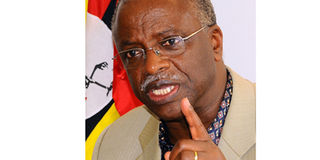Many power centres affecting service delivery, says Mbabazi

Prime Minister Amama Mbabazi addresses a press conference in Kampala. He has blamed the many power centres in government for the poor service delivery. PHOTO BY JOSEPH KIGGUNDU
What you need to know:
On the spot. The prime minister names several offices, including his own, as some of the many power centres slowing down service delivery.
The National Development Policy Forum
Purpose: The National Development Policy Forum is intended to act as a platform for constructive policy debates that can lead to a better understanding of Uganda’s development issues.
Result: The outcome of the forum is expected to inform policy intervention by government and other development stakeholders to ensure effective service delivery in the country.
Stakeholders: The stakeholders of the forum will include the general public, government ministries and agencies, local governments and urban authorities, development patners, civil society and the private sector.
The presence of very many centres of power in government is hampering service delivery, the Prime Minister has said.Speaking at the launch of the National Development Policy Forum on Friday evening, Mr Amama Mbabazi cited the failure by the government to fix the bridge that connects Kanungu to the rest of the country for the past two years despite resources being earmarked for the works.
He said the contractor assigned the work had been found wanting but efforts to remove him had failed due to “different power centres”.
Frustrated?
“I have made all sorts of threats in and outside Cabinet, including a unilateral declaration of independence for Kanungu from government,” Mr Mbabazi said.
The matter of harmonising these power centres, said Mr Mbabazi, is one that “Ugandans have to look at critically”.
Mr Mbabazi’s complaint comes on the backdrop of incessant protests by President Museveni about the conduct of government bureaucrats who frustrate investors as they seek bribes.
The forum was organised by the National Planning Authority and Advocate Coalition for Development and Environment (ACODE), an NGO under the theme “Effect of Procurement Procedures on Resource Absorption and Project Implementation in Uganda”.
Mr Mbabazi advised that while procurement and its processes are important, they should facilitate, and not stifle, government operations.
The loss
Mr David Luyimbazi, the planning director at UNRA, said for every month lost while procuring a $100 million (about Shs243 billion) project, Ugandan taxpayers pay an additional $1 million (about Shs2.4 billion) to cater for inflation losses.
“A long procurement process adds unnecessary cost to a project. Someone has to pay for the cost of inflation as a contractor cannot simply absorb increase of these costs,” Mr Luyimbazi said.
Law blamed
Mr Arthur Bainomugisha, the executive director of ACODE, said there is an urgent need to review the legal framework of the Public Procurement and Disposal of Public Assets Authority but without affecting its integrity.
“While the procurement process must be rigorous, it should never constrain government to deliver services to the people,” he said.



